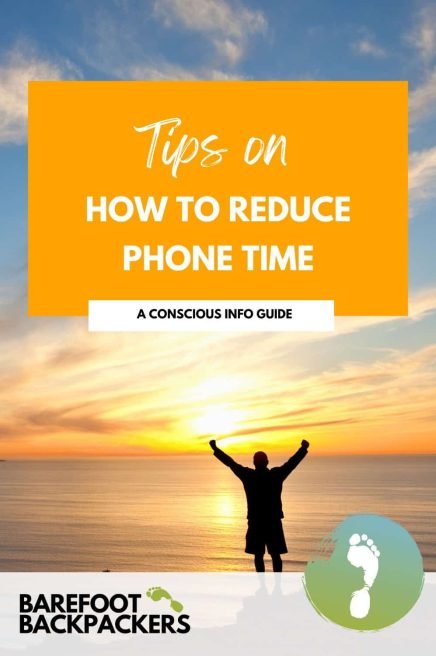The smartphone has become fully integrated into modern life. It is hard to imagine a world before it was everywhere, with maps in our pockets, instant messages, and endless information. Yet the same device that connects us to the outside world can also disconnect us from ourselves. This guide is not about giving up your phone, but about learning how to reduce phone time and use it more consciously so it adds to your life rather than distracts you from it.
Once your phone is set up to be more purposeful and less addictive, the difference is noticeable. The constant urge to check and scroll fades, giving way to a greater sense of calm. Hours return to your day, and in in its place you may finder greater peace of mind.

This blog is supported by the community. We may earn a small commission if you choose to purchase through our links, which allows us to keep creating content. As an Amazon Associate, we earn from qualifying purchases. Learn more.
Why Reduce Phone Time
Digital well being is not about rejecting technology but about creating balance. Excessive screen time is linked with poor sleep, stress, reduced focus, and lethargy. After exhausting your brains dopamine receptors you are left feeling unaccomplished when reality sinks in after how much time was spent scrolling. Learning how to set boundaries with your phone allows you to reclaim energy, clarity, and presence in daily life.
Phone Management Strategies
1. Start with awareness.
One of the simplest and most powerful steps is becoming conscious of your screen time. Phones now have built-in tools that show how long you spend on each app. Drawing awareness to where your attention is being is the first step to positive change.
2. Declutter your apps.
Delete the ones you never use, then go a step further by reducing your phone to the bare essentials. Every unnecessary app is a potential attention trap.
3. Compartmentalise your usage.
This is one of the most effective strategies for reducing screen time. Keep your main phone simple with only essential apps. Then set aside a second device such as an old smartphone, tablet, or computer that stays at home. This device becomes the place for social media, email, and streaming. By separating use in this way you are not cutting these things out entirely but you are removing their constant presence in your pocket.
Essential Apps for a Minimal Phone
On the primary device keep the essential apps. If an app is needed, then it can be temporarily installed.
- Google Maps – local buses, routes, and navigation.
- Uber – for taxis and trains.
- One messaging app – WhatsApp, Signal, or iMessage. The goal is not to be antisocial.
- Music – downloaded playlists rather than algorithm-driven feeds.
- Podcasts or audiobooks – for mindful listening.
- A private browser – such as Brave.
- VPN and eSIM apps – for privacy and data.
- A translation app such as DeepL – essential when travelling.
Practical Swaps and Alternatives to Reduce Phone Time
- Use a non-ticking alarm clock instead.
- Take handwritten notes rather than typing everything up.
- Use a video camera instead of the phone
- Mp3 Player for music.
- Replace scrolling for reading or walking.
- Consider a GPS device for navigation.
- Use less addictive screens.
Each swap removes small daily dependencies and reinforces digital independence.
Lifestyle Hacks to Reduce Phone Time
- Separate work and personal devices. This creates a clear boundary between focused hours and downtime.
- Use airplane mode during the day. Check messages periodically. This saves you from being “always available” to respond.
- Leave the house without your phone. This underrated step offers a rare feeling of freedom. You quickly learn that not every moment needs to be connected.

Morning and Evening Rituals
Late-night scrolling is one of the biggest disruptors of natural sleep. The blue light strains the eyes keeping you wired when you should be getting ready to rest. In hostels all to many times you see faces lit up with blue light moments before they go to sleep.
Swap this for a grounding evening routine: read, stretch, or journal. In the morning, avoid your phone until after you are awake and have had some early morning sunlight. Following your body’s circadian rhythm instead of rushing into notifications will leave you more refreshed and focused throughout the day.
A Healthier Digital Life
The phone itself is not the problem. The challenge is learning how to use it consciously. By reducing screen time, simplifying your apps, and creating mindful rituals, you reclaim freedom over your attention. What you gain in return is clarity, calm, and peace of mind which is worth far more than the endless scroll.








